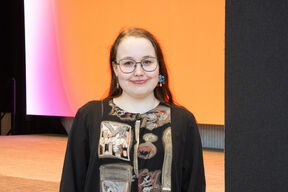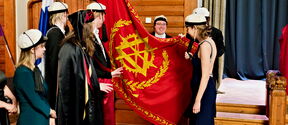Towards an accessible sense of community

If you ask me, the best part of student life is the sense of community. In Otaniemi, in particular, various communities can shape students’ social identities. Whether it is your guild or subject association, fresher group, or recreational club, the foundations of belonging can be created in many contexts.
I hope that everyone has the opportunity to take part in the activities they choose and experience a genuine sense of belonging. However, every community has its boundaries: who is included and who is left out. Equity is essential for a strong sense of community—and there is room for improvement within our Aalto community.
My own experiences with equity challenges in academic circles are related to ableism. The mindset that health and the absence of disability are considered the norm, with people being valued based on their ability to function. Ableism is deeply intertwined with society’s structures, hierarchies, and representations, creating conditions that allow both indirect and direct discrimination.
As someone who uses crutches long-term, I have grown accustomed to all kinds of questions from both acquaintances and strangers. Most of these are harmless and well-intended. The common assumption is that crutches are only temporary aids, which is often true. However, the fact is that no one’s personal characteristics can be assumed based on their use of assistive devices—or their appearance in general.
Not all of these questions have lifted my spirits. Did you have so much fun over the weekend that your legs can’t carry you? Are those crutches just part of your outfit? What do you even need them for since you move so smoothly? Although these comments may not have been meant to insult, they still feel disrespectful and belittling—and they are classic examples of unconscious ableism.
It is stereotypical to assume that disability only includes visible disabilities, as if everyone’s functional limitations must be visible. On the other hand, there may be an unconscious need to find an explanation for someone’s disability or the use of assistive devices. In the end, we may find that ‘acceptance’ of disability is tied to how visible those disabilities are.
In the academic community, unconscious ableism shows up, for example, in the assumption that accessibility only refers to the built environment. We have lifts, automatic doors, and ramps, and sometimes event descriptions mention the inaccessibility of venues. However, true accessibility also involves considering other dimensions, such as accessible communication and the flexible adaptation of practices to meet the diverse needs of our community.
Dismantling ableism requires from each of us not only self-reflection, but, more importantly, a shift in attitudes: the willingness to listen to and understand the experiences of others, and the courage to challenge established norms that emphasise non-disability.
Equity is key to ensuring that a sense of community is accessible to everyone. Achieving this requires communities to declare zero tolerance for discrimination and, in addition to written policies, take concrete action: valuing diversity, recognizing discriminatory attitudes and privileges, and consistently assessing the implementation of equity.
Jenni Toivonen
AYY Board Member, Responsible for Equity
Please respond to AYY’s survey on equity in the Aalto student community and win movie tickets! The survey is open from 10 Mar to 28 Mar 2025 and takes approximately 10–20 minutes to complete. Based on the survey results, we will plan the necessary measures to enhance equity in the Aalto community. Link to the survey.
Read more news

Design contest for the Design Notebook now open
Are you the next designer of the Design Notebook? TOKYO’s and AYY’s notebook will be published again in autumn 2026, and its designer will be traditionally selected from among our students. The Design Notebook has been very popular, and we hope the notebook will be useful and bring joy to as many members as possible. The contest will begin on 23 Feb 2026 and end on 16 Mar 2026 at 15.00.
What is Trinet, and what will happen to AYY’s internet connection?
The internet service provider for Aalto University Student Union (AYY) residents is about to change. We have heard that this change has raised concerns within the student community. In this article, Chair of the AYY Board Joona Lipponen responds to questions that concern our members.
Otakaari 15 art contest now open
Aalto University Student Union invites Aalto students to participate in an art contest seeking permanent artworks for a new student housing building on Otakaari 15, to be completed this summer. The contest’s inspiring themes include the Otaniemi campus, the Aalto University community, and its vibrant student life. Application period: 9 Feb–31 Mar 2026
